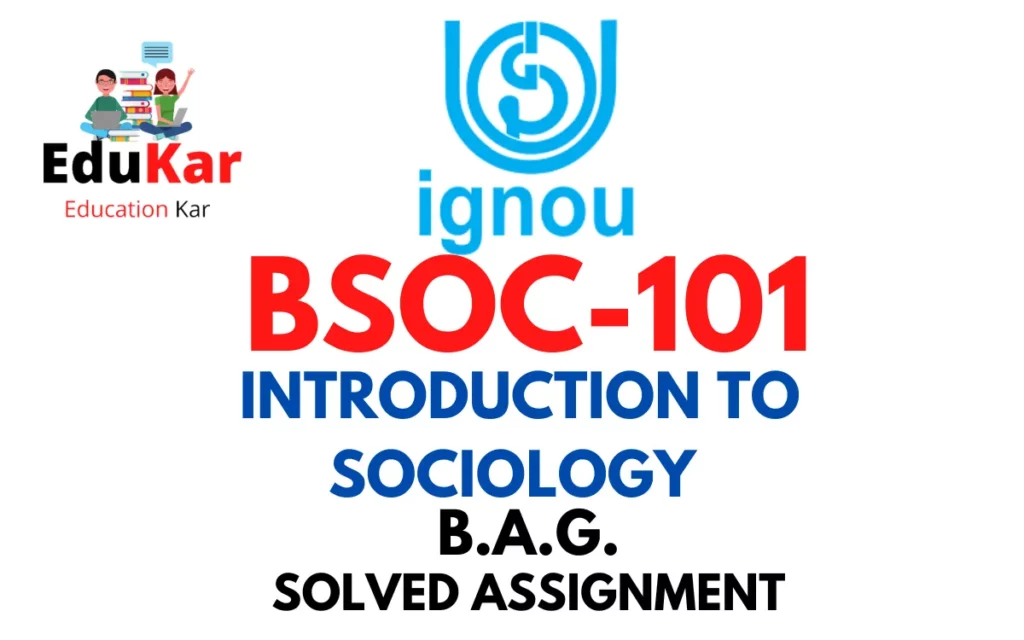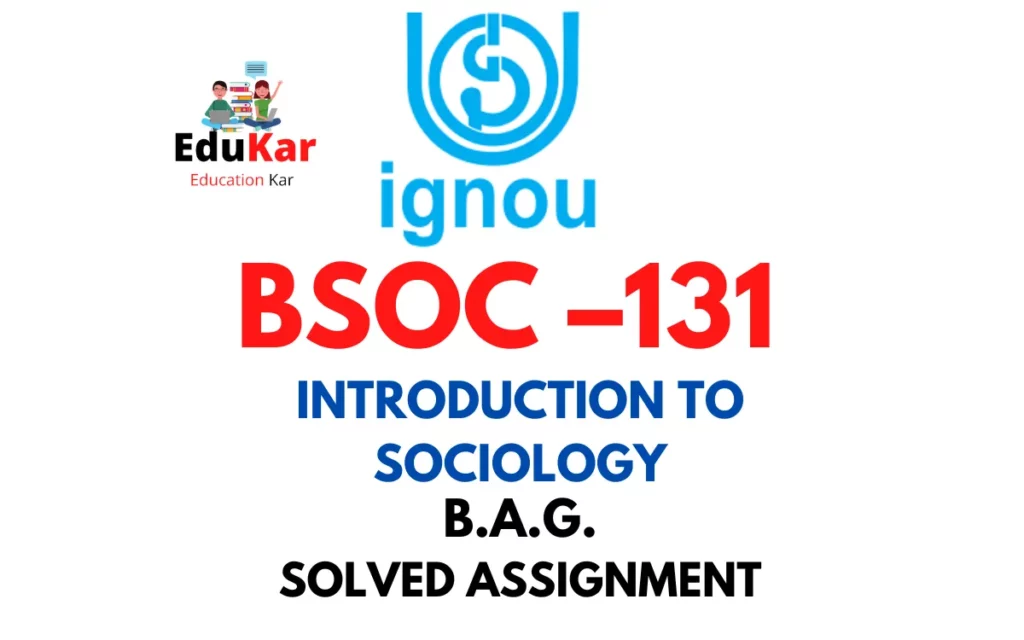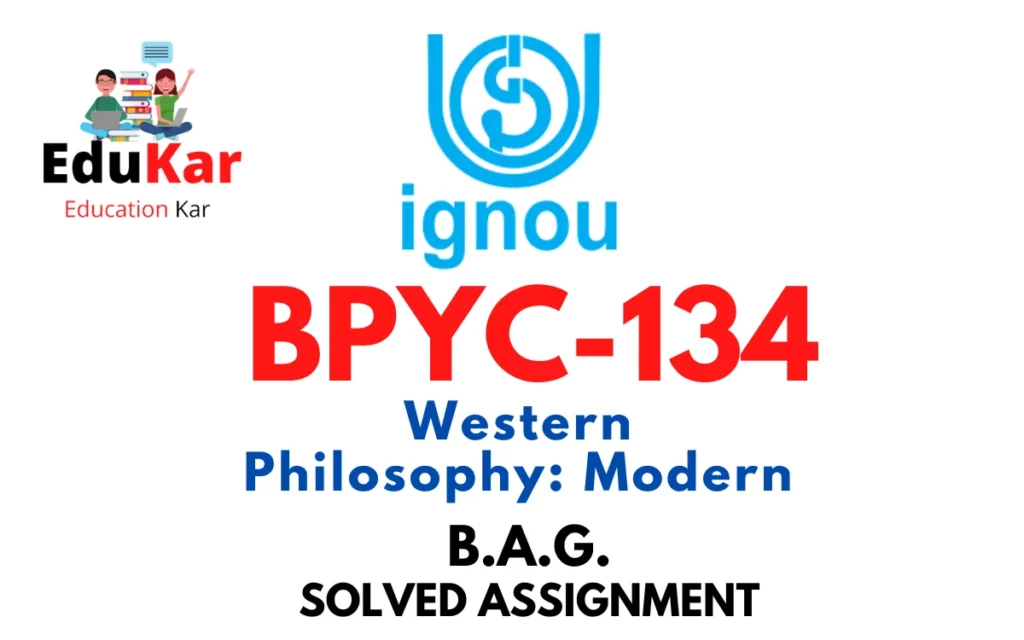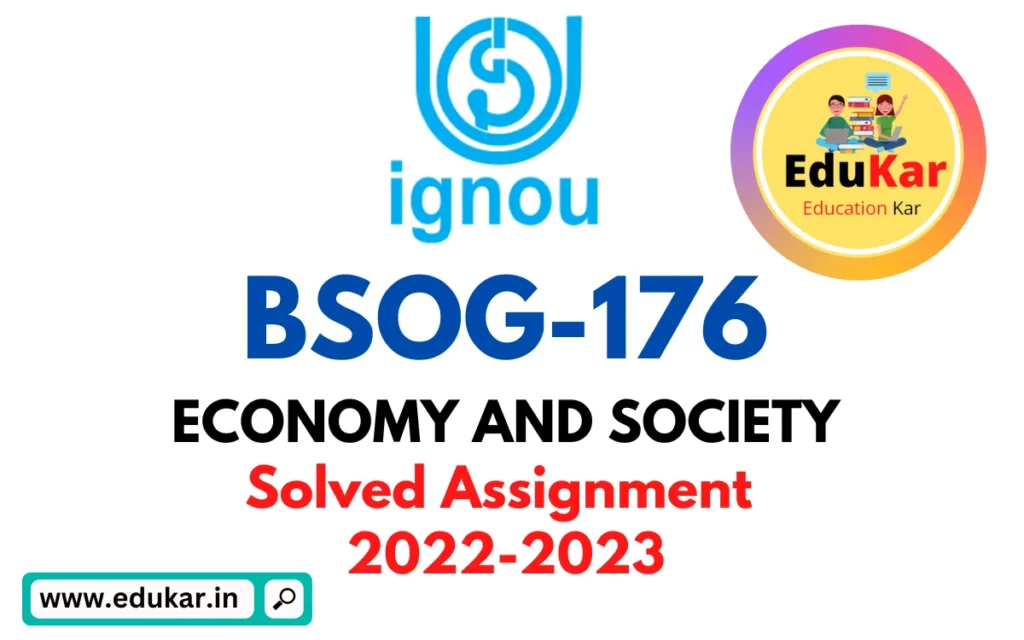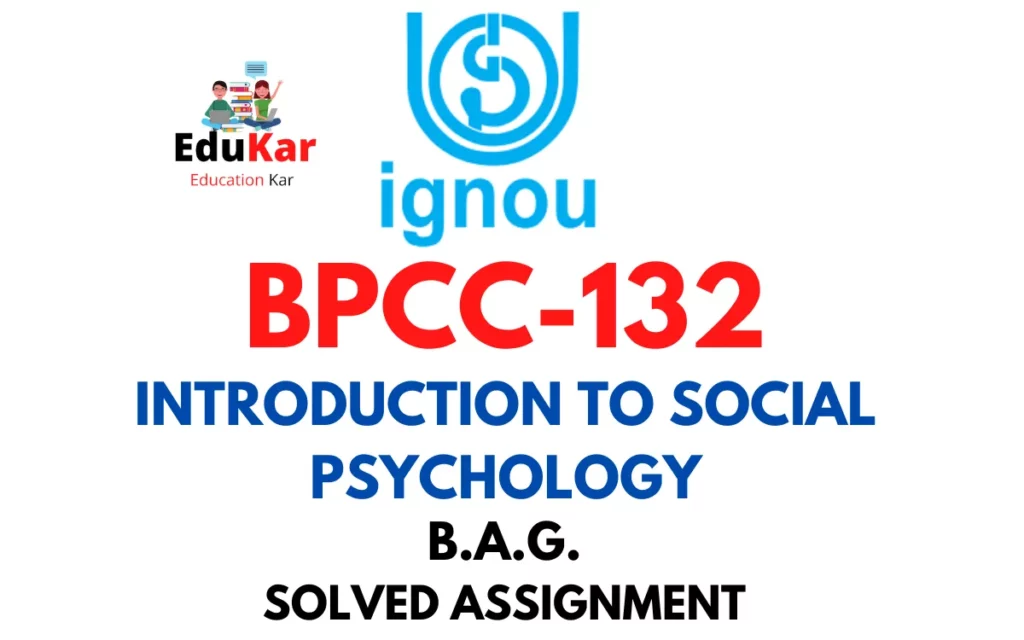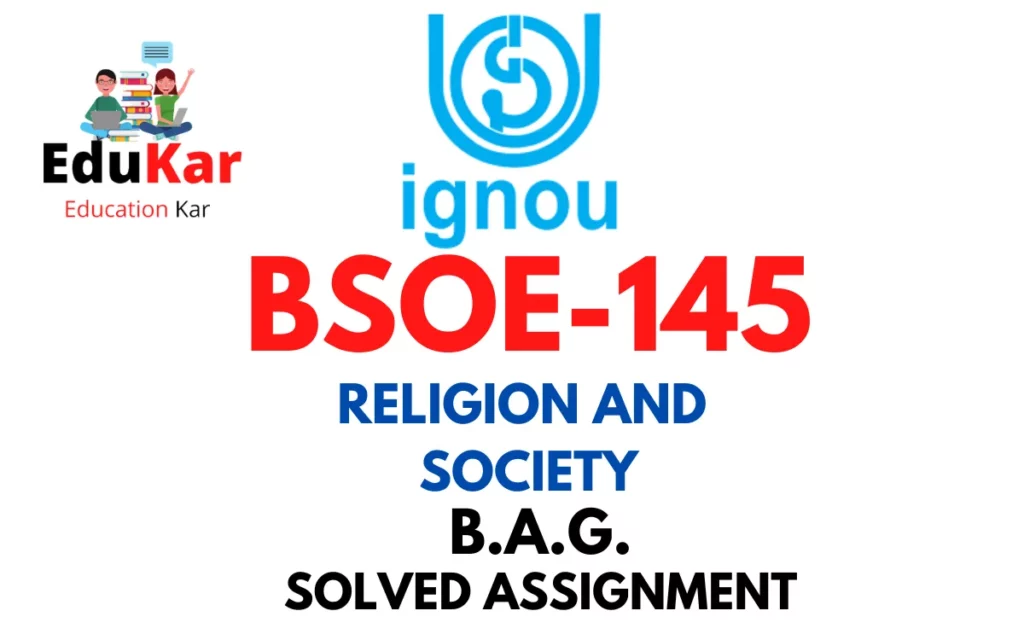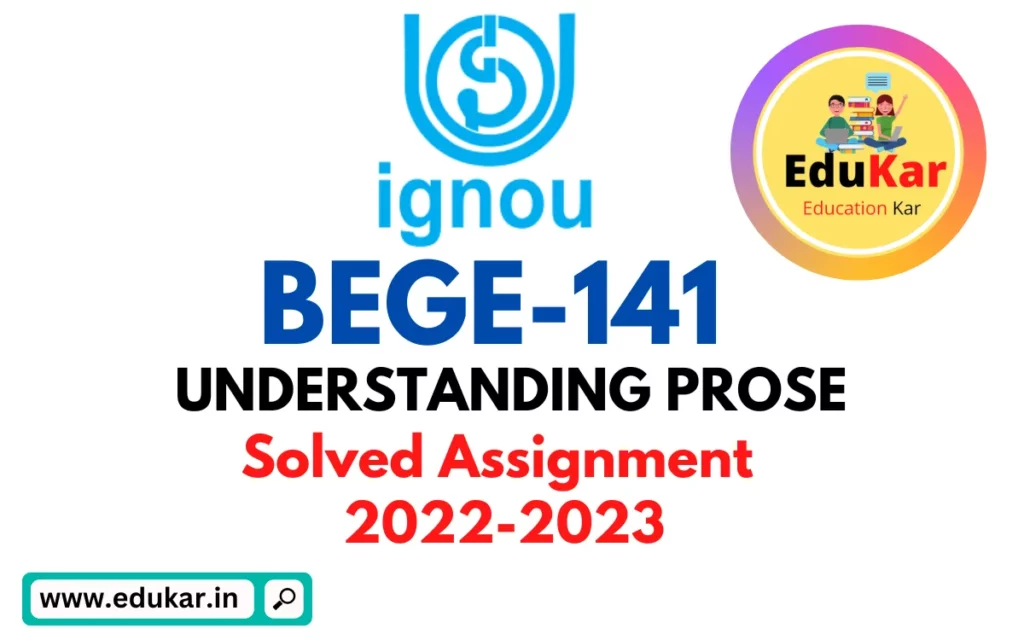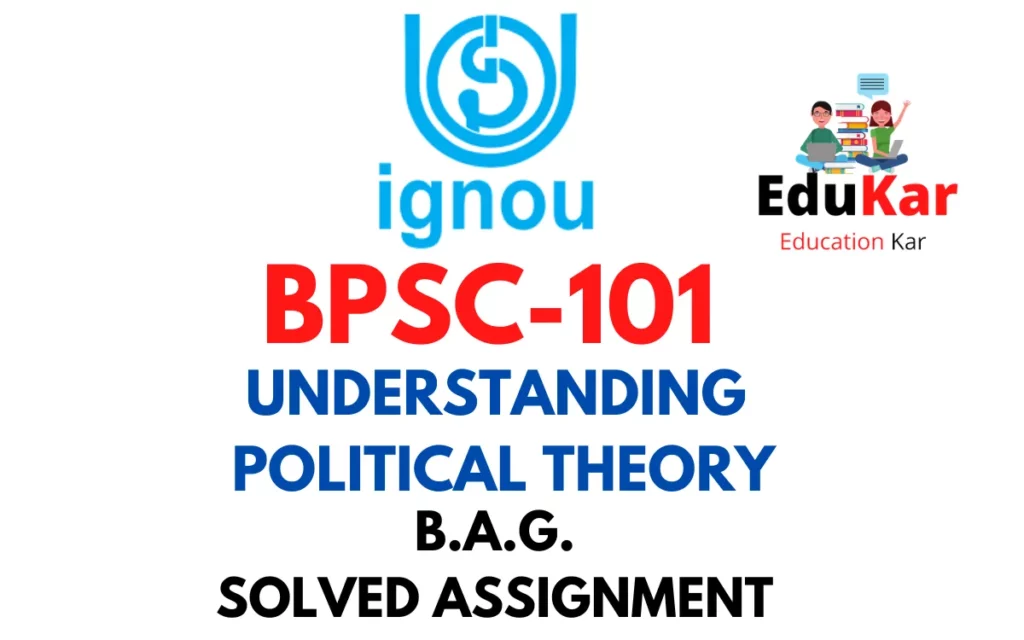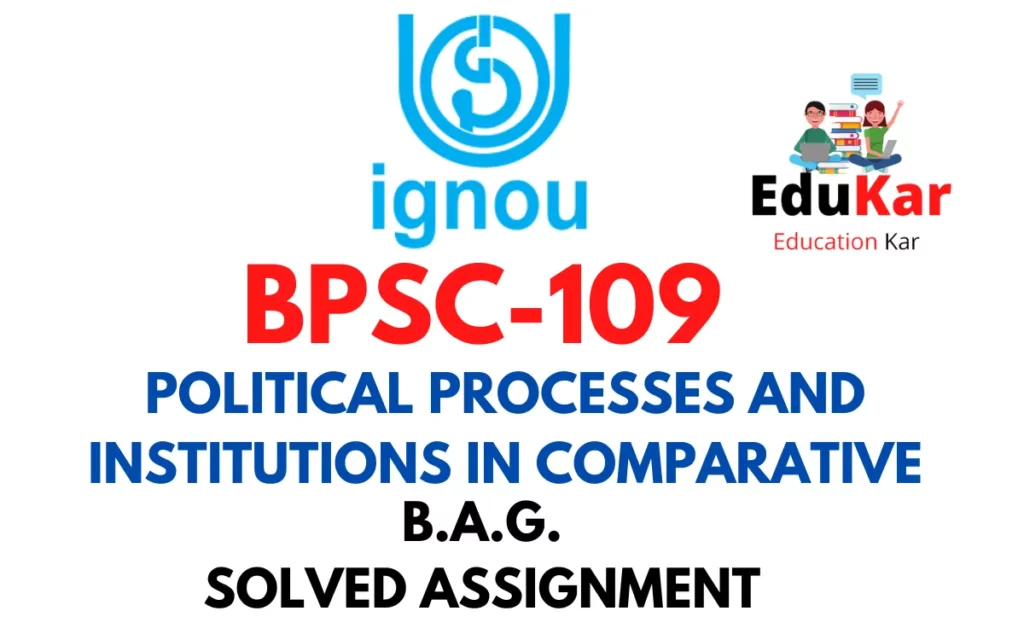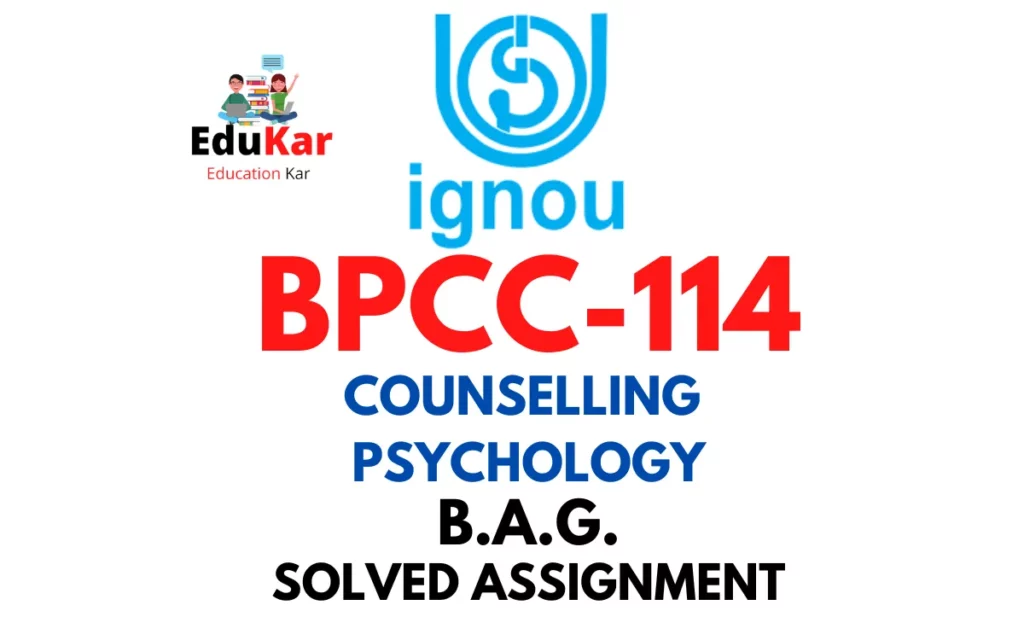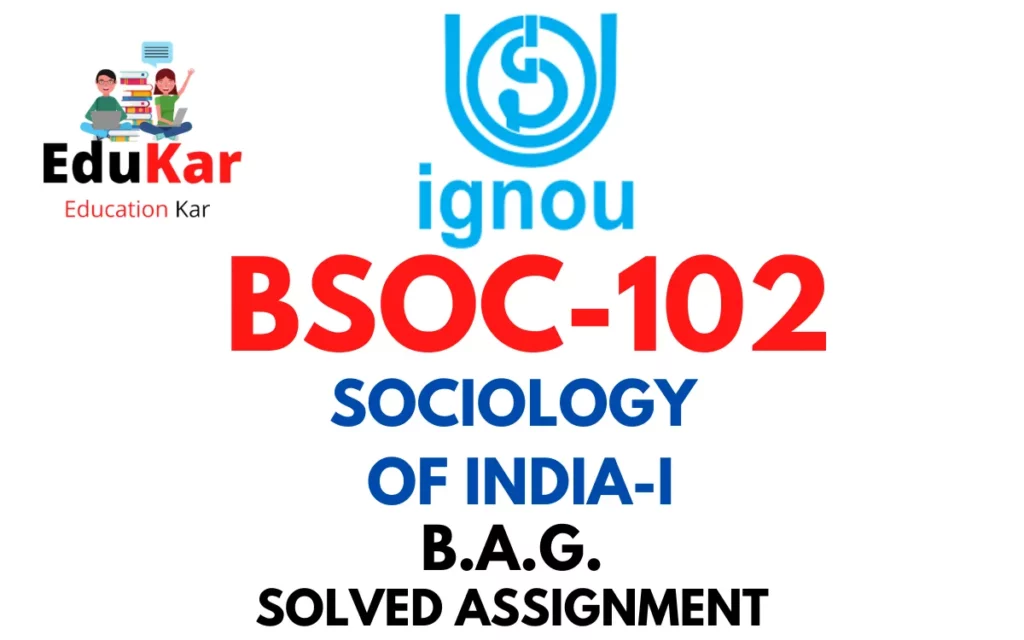Contents
- 1 Assignment-I
- 2 Answer the following questions in about 500 words each.
- 3 1. Write a note on Social Contract theorists.
- 4 2. Examine Rousseau’s critique of liberal representative government.
- 5 Assignment-II
- 6 Answer the following questions in about 250 words each.
- 7 1. Discuss Rousseau’s concept of natural education.
- 8 2. Elaborate upon Mary Wollstonecraft’s plea for women’s rights.
- 9 3. Examine Mary Wollstonecraft’s critique of Rousseau’s idea of education.
- 10 Assignment-III
- 11 Answer the following questions in about 100 words each.
- 12 1. Mill on Individualism
- 13 2. Mill on rights of women and gender equality
- 14 3. Materialism before and after Marx
- 15 4. Dialectical Method
- 16 5. Class struggle
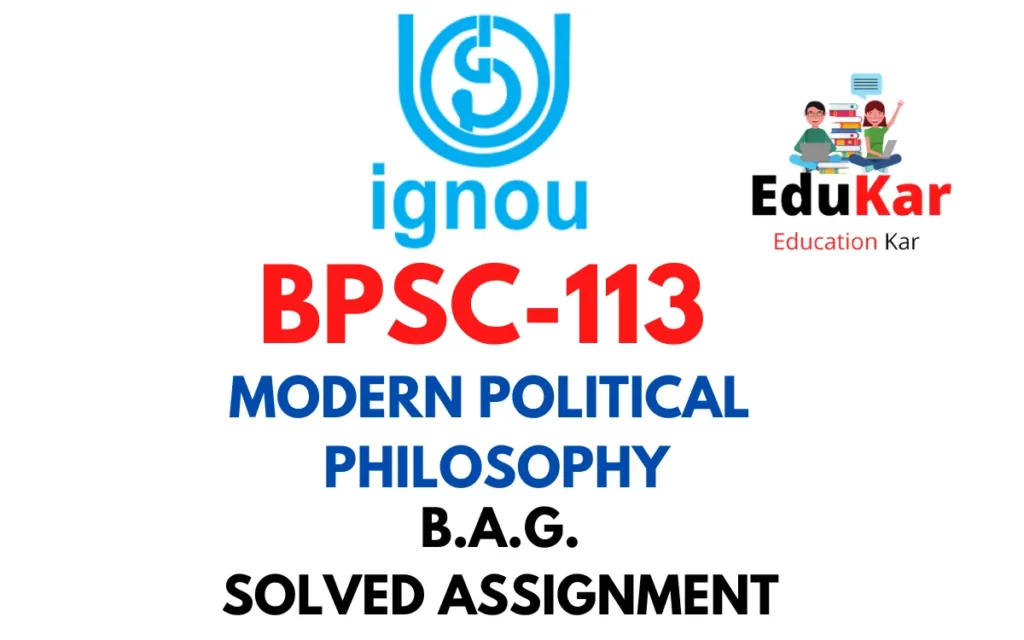
| Title | BPSC-113: IGNOU BAG Solved Assignment 2022-2023 |
| University | IGNOU |
| Degree | Bachelor Degree Programme |
| Course Code | BPSC-113 |
| Course Name | MODERN POLITICAL PHILOSOPHY |
| Programme Name | Bachelor of Arts (General) |
| Programme Code | BAG |
| Total Marks | 100 |
| Year | 2022-2023 |
| Language | English |
| Assignment Code | BPSC-113/ASST/TMA/2022-23 |
| Last Date for Submission of Assignment: | For June Examination: 31st April For December Examination: 30th September |
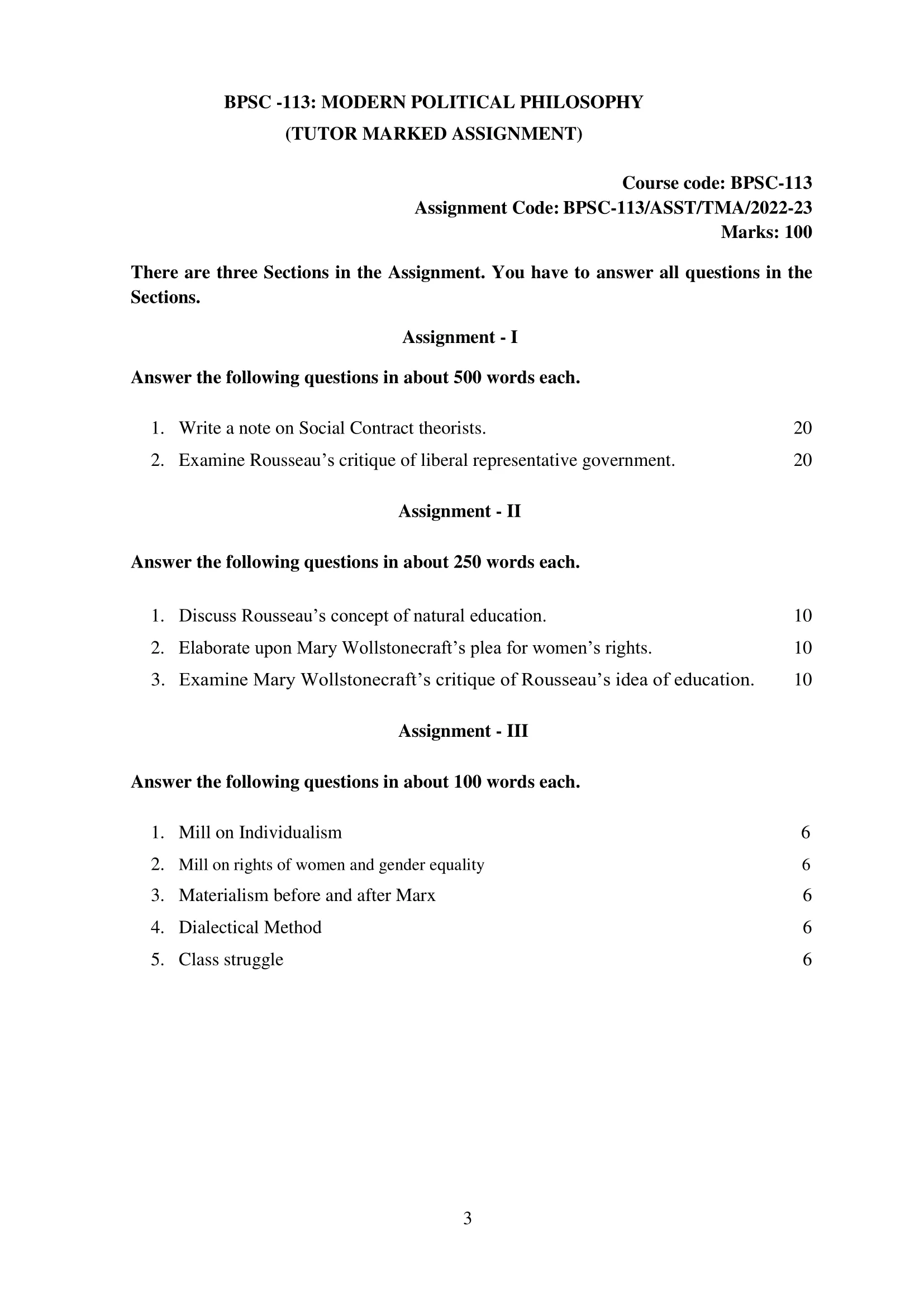
Assignment-I
Answer the following questions in about 500 words each.
1. Write a note on Social Contract theorists.
Ans: Social Contract theorists are a group of philosophers who, through their writings and ideas, explore the concept of the social contract – an implicit agreement between individuals and the state or government. This agreement establishes a mutual relationship of rights and duties between individuals and the state, and is based on the idea that individuals willingly give up some of their rights and freedoms in exchange for the protection and benefits provided by the state.
One of the earliest and most well-known social contract theorists is Thomas Hobbes, who believed that humans were inherently selfish and violent, and that life in the state of nature (without government) would be “solitary, poor, nasty, brutish, and short.” Hobbes argued that people would be willing to surrender their natural rights to a powerful government that could provide security and maintain order. This idea is embodied in Hobbes’ book, Leviathan, which he published in 1651.
Another important social contract theorist is John Locke, who believed that people were naturally rational and moral, and that the role of government was to protect their natural rights to life, liberty, and property. Locke’s social contract theory emphasizes the idea that individuals have the right to rebel against a government that violates their rights, and that the legitimacy of a government is based on its ability to protect the rights of its citizens.
Jean-Jacques Rousseau was another prominent social contract theorist who believed that humans were born free and equal, but that society and civilization had corrupted them. Rousseau believed that the social contract should be based on the “general will” of the people, and that the government’s role was to protect this will and promote the common good.
Other important social contract theorists include Immanuel Kant, who believed that the social contract was based on the idea of “universal reason,” and that individuals had a duty to act according to reason in order to maintain a just and peaceful society; and John Rawls, who proposed the “original position” as a thought experiment to demonstrate how a just social contract would be established.
2. Examine Rousseau’s critique of liberal representative government.
Ans: Jean-Jacques Rousseau was a philosopher who lived during the 18th century, and he is well-known for his influential works on political philosophy, including his critique of liberal representative government. In his book, “The Social Contract,” Rousseau argues that liberal representative government is flawed because it fails to promote the general will of the people.
According to Rousseau, liberal representative government is based on the idea of individual rights, and that the government’s role is to protect these rights. However, Rousseau argues that individual rights are not enough to ensure a just and equal society, and that the government should be based on the general will of the people. The general will is the collective will of the people, and it represents the common good that transcends individual interests.
Rousseau argues that liberal representative government fails to promote the general will because it is based on the principle of representation. In this system, individuals elect representatives to make decisions on their behalf, but Rousseau argues that this creates a conflict between the interests of the representatives and the interests of the people they represent. He argues that representatives will be more concerned with their own interests and the interests of their constituents rather than the general will of the people.
Rousseau further argues that liberal representative government also fails to promote the general will because it allows for the accumulation of wealth and power by a small elite. This elite class, he argues, will use their wealth and power to promote their own interests rather than the general will of the people. As a result, the government will become corrupt, and the interests of the people will be ignored.
To promote the general will, Rousseau proposes a system of direct democracy, in which individuals participate directly in the decision-making process. He argues that this would create a more just and equal society, in which individuals would have an equal say in the decisions that affect them.
Assignment-II
Answer the following questions in about 250 words each.
1. Discuss Rousseau’s concept of natural education.
Ans: Rousseau’s concept of natural education emphasizes the importance of allowing children to develop in accordance with their natural inclinations and interests. In his view, education should not impose artificial constraints on the child’s development, but rather encourage and facilitate their natural growth.
According to Rousseau, children should be allowed to learn by exploring their environment and following their natural curiosity. He believed that children are inherently good and that their natural inclinations will lead them towards moral and virtuous behavior. Therefore, he argued that children should not be taught using conventional methods like reading and writing, but should instead be allowed to learn through play and practical activities.
Rousseau’s natural education also emphasizes the importance of physical activity and exercise in a child’s development. He believed that physical activity helps to develop a child’s strength, agility, and coordination, which are essential for their overall health and well-being.
Furthermore, Rousseau argued that education should be tailored to the individual needs of each child, rather than imposing a one-size-fits-all approach. He believed that children have different talents and abilities and should be allowed to develop at their own pace.
In summary, Rousseau’s concept of natural education emphasizes the importance of allowing children to learn through exploration and play, physical activity, and individualized instruction. He believed that children should be encouraged to develop in accordance with their natural inclinations and interests, rather than being forced to conform to predetermined educational standards.
2. Elaborate upon Mary Wollstonecraft’s plea for women’s rights.
Ans: Mary Wollstonecraft was an 18th-century feminist philosopher who is widely regarded as a pioneer of women’s rights. Her seminal work, “A Vindication of the Rights of Woman,” published in 1792, was a groundbreaking plea for the equal rights and education of women.
Wollstonecraft argued that women were not inherently inferior to men but were simply denied the same opportunities for education and personal development. She criticized the traditional view that women were only suited for domestic duties and argued that they were capable of participating in public life and contributing to society.
One of Wollstonecraft’s key arguments was that women should have access to the same education as men. She believed that education was essential for women to develop their talents and skills and to be able to make informed decisions about their lives. She argued that women’s education should not be limited to learning domestic skills but should also include training in the arts and sciences.
Wollstonecraft also advocated for women’s political rights, arguing that they should have the right to participate in the democratic process and have a voice in government. She criticized the exclusion of women from public life and argued that they should have the same rights as men to vote and hold public office.
Moreover, Wollstonecraft argued that marriage should be an equal partnership between husband and wife, rather than a relationship of domination and submission. She believed that women should have the right to choose their own partners and that both spouses should share equally in the responsibilities of raising children and managing the household.
3. Examine Mary Wollstonecraft’s critique of Rousseau’s idea of education.
Ans: Mary Wollstonecraft, an English writer and philosopher, was a vocal critic of Jean-Jacques Rousseau’s ideas of education. In particular, Wollstonecraft took issue with Rousseau’s belief that women should be educated differently from men, and his emphasis on domesticity as the sole domain of women.
In her work “A Vindication of the Rights of Woman,” published in 1792, Wollstonecraft argues that Rousseau’s views on education perpetuated gender inequalities and hindered women’s ability to achieve full citizenship. She criticized Rousseau’s view that women’s education should be limited to domestic skills and should focus on pleasing men.
Wollstonecraft believed that this kind of education not only limited women’s potential but also reinforced the patriarchal power structures that oppressed women. She argued that women should receive the same education as men, with a focus on reason and virtue rather than just practical skills.
Wollstonecraft also challenged Rousseau’s view that women should be excluded from public life and politics. She believed that women should have the same rights as men to participate in the democratic process and make decisions that affect their lives. In her view, the exclusion of women from public life perpetuated gender inequalities and prevented women from achieving their full potential.
Furthermore, Wollstonecraft criticized Rousseau’s views on marriage and the family. She believed that Rousseau’s emphasis on the domestic sphere as the sole domain of women reinforced gender roles and prevented women from achieving their full potential. Wollstonecraft argued that marriage should be an equal partnership, rather than a relationship of domination and submission.
Assignment-III
Answer the following questions in about 100 words each.
1. Mill on Individualism
Ans: John Stuart Mill, a 19th-century British philosopher, was a proponent of individualism, which holds that individuals should be free to make their own choices and pursue their own interests, as long as they do not harm others. In his essay “On Liberty,” Mill argued that the state should not interfere in the lives of individuals unless it is necessary to prevent harm to others. He believed that freedom of thought, speech, and action were essential for human flourishing and that society should encourage diversity and experimentation. Mill’s individualism emphasized the importance of individual rights and autonomy, and his ideas have influenced modern liberalism and libertarianism.
2. Mill on rights of women and gender equality
Ans: John Stuart Mill was an advocate of women’s rights and gender equality. In his book “The Subjection of Women,” he argued that women had been historically oppressed and denied their natural rights by a male-dominated society. He believed that women should have the same legal and political rights as men, and that women should be allowed to participate fully in all aspects of society, including education, politics, and the workplace. Mill also argued that traditional gender roles and stereotypes were harmful to both men and women and that individuals should be free to pursue their interests and talents regardless of gender. His ideas were influential in the development of the feminist movement, and his advocacy for women’s rights contributed to the eventual expansion of legal and political rights for women.
3. Materialism before and after Marx
Ans: Materialism, the philosophical view that physical matter is the fundamental substance of reality, existed before Marx, but Marx’s interpretation and application of materialism had a profound impact on history and social science.
Before Marx, materialism was primarily a metaphysical and epistemological theory that explained the nature of reality and how we come to know it. It was associated with thinkers like Democritus, Hobbes, and Locke, who emphasized the role of physical matter in shaping human experience.
Marx, however, transformed materialism into a powerful tool for understanding and critiquing the social, economic, and political structures of his time. He argued that the material conditions of production and distribution are the primary forces driving history and society, and that the struggles between classes are a result of these material conditions.
Marx’s materialism influenced the development of Marxist theory, which became a major force in 20th-century political and social movements. It also sparked debates about the role of materialism in social science and the relationship between material conditions and human consciousness.
4. Dialectical Method
Ans: The dialectical method is a way of reasoning that involves examining and synthesizing opposing viewpoints or ideas in order to arrive at a new understanding or truth. It was first developed by the ancient Greek philosopher, Heraclitus, and later refined by Hegel and Marx. The dialectical process involves the thesis, antithesis, and synthesis. The thesis represents the original idea or position, while the antithesis is the opposing viewpoint or counterargument. The synthesis is the new understanding that emerges through the reconciliation of these opposing viewpoints. The dialectical method has been influential in fields such as philosophy, politics, and social science, and is still used today as a way of analyzing complex systems and phenomena.
5. Class struggle
Ans: Class struggle refers to the conflicts between different social classes in a society, often over control of resources, power, and wealth. It is a concept that has been central to Marxist theory, which sees history as a series of class struggles between those who own the means of production (the bourgeoisie) and those who do not (the proletariat). In Marxist theory, the resolution of the class struggle is achieved through the overthrow of the bourgeoisie by the proletariat, leading to the establishment of a classless society. Class struggle remains a topic of debate and analysis in political and economic theory, as well as in the broader society.
How to Download BPSC-113 Solved Assignment?
You can download it from the www.edukar.in, they have a big database for all the IGNOU solved assignments.
Is the BPSC-113 Solved Assignment Free?
Yes this is absolutely free to download the solved assignment from www.edukar.in
What is the last submission date for BPSC-113 Solved Assignment?
For June Examination: 31st April, For December Examination: 30th October



